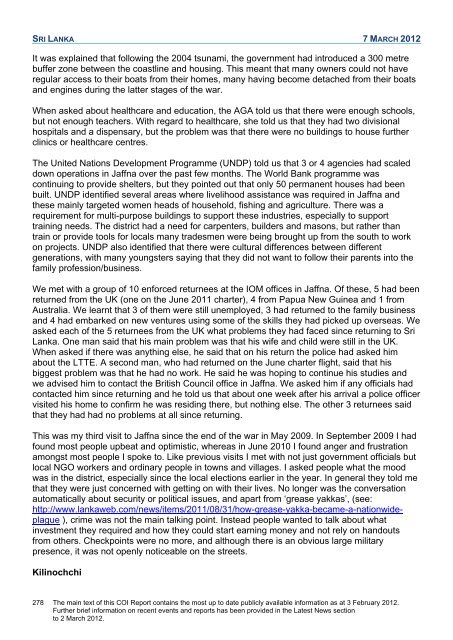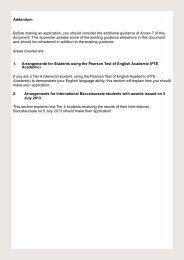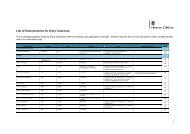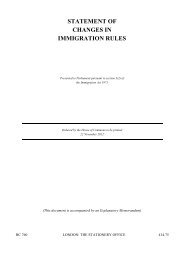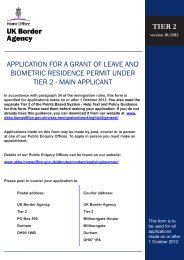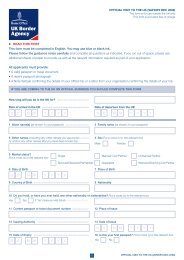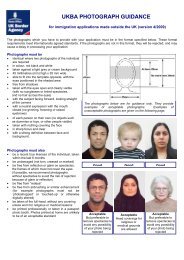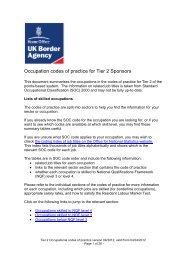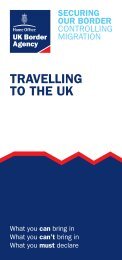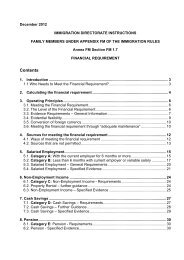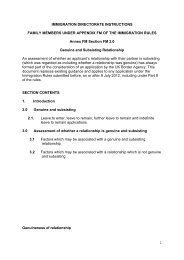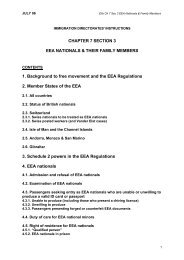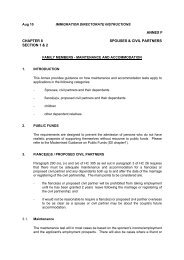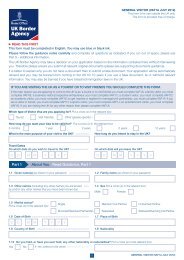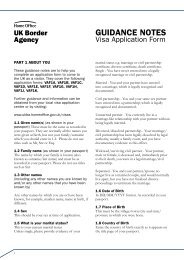COI Report March 2012 - UK Border Agency - Home Office
COI Report March 2012 - UK Border Agency - Home Office
COI Report March 2012 - UK Border Agency - Home Office
You also want an ePaper? Increase the reach of your titles
YUMPU automatically turns print PDFs into web optimized ePapers that Google loves.
SRI LANKA 7 MARCH <strong>2012</strong><br />
It was explained that following the 2004 tsunami, the government had introduced a 300 metre<br />
buffer zone between the coastline and housing. This meant that many owners could not have<br />
regular access to their boats from their homes, many having become detached from their boats<br />
and engines during the latter stages of the war.<br />
When asked about healthcare and education, the AGA told us that there were enough schools,<br />
but not enough teachers. With regard to healthcare, she told us that they had two divisional<br />
hospitals and a dispensary, but the problem was that there were no buildings to house further<br />
clinics or healthcare centres.<br />
The United Nations Development Programme (UNDP) told us that 3 or 4 agencies had scaled<br />
down operations in Jaffna over the past few months. The World Bank programme was<br />
continuing to provide shelters, but they pointed out that only 50 permanent houses had been<br />
built. UNDP identified several areas where livelihood assistance was required in Jaffna and<br />
these mainly targeted women heads of household, fishing and agriculture. There was a<br />
requirement for multi-purpose buildings to support these industries, especially to support<br />
training needs. The district had a need for carpenters, builders and masons, but rather than<br />
train or provide tools for locals many tradesmen were being brought up from the south to work<br />
on projects. UNDP also identified that there were cultural differences between different<br />
generations, with many youngsters saying that they did not want to follow their parents into the<br />
family profession/business.<br />
We met with a group of 10 enforced returnees at the IOM offices in Jaffna. Of these, 5 had been<br />
returned from the <strong>UK</strong> (one on the June 2011 charter), 4 from Papua New Guinea and 1 from<br />
Australia. We learnt that 3 of them were still unemployed, 3 had returned to the family business<br />
and 4 had embarked on new ventures using some of the skills they had picked up overseas. We<br />
asked each of the 5 returnees from the <strong>UK</strong> what problems they had faced since returning to Sri<br />
Lanka. One man said that his main problem was that his wife and child were still in the <strong>UK</strong>.<br />
When asked if there was anything else, he said that on his return the police had asked him<br />
about the LTTE. A second man, who had returned on the June charter flight, said that his<br />
biggest problem was that he had no work. He said he was hoping to continue his studies and<br />
we advised him to contact the British Council office in Jaffna. We asked him if any officials had<br />
contacted him since returning and he told us that about one week after his arrival a police officer<br />
visited his home to confirm he was residing there, but nothing else. The other 3 returnees said<br />
that they had had no problems at all since returning.<br />
This was my third visit to Jaffna since the end of the war in May 2009. In September 2009 I had<br />
found most people upbeat and optimistic, whereas in June 2010 I found anger and frustration<br />
amongst most people I spoke to. Like previous visits I met with not just government officials but<br />
local NGO workers and ordinary people in towns and villages. I asked people what the mood<br />
was in the district, especially since the local elections earlier in the year. In general they told me<br />
that they were just concerned with getting on with their lives. No longer was the conversation<br />
automatically about security or political issues, and apart from ‗grease yakkas‘, (see:<br />
http://www.lankaweb.com/news/items/2011/08/31/how-grease-yakka-became-a-nationwideplague<br />
), crime was not the main talking point. Instead people wanted to talk about what<br />
investment they required and how they could start earning money and not rely on handouts<br />
from others. Checkpoints were no more, and although there is an obvious large military<br />
presence, it was not openly noticeable on the streets.<br />
Kilinochchi<br />
278 The main text of this <strong>COI</strong> <strong>Report</strong> contains the most up to date publicly available information as at 3 February <strong>2012</strong>.<br />
Further brief information on recent events and reports has been provided in the Latest News section<br />
to 2 <strong>March</strong> <strong>2012</strong>.


